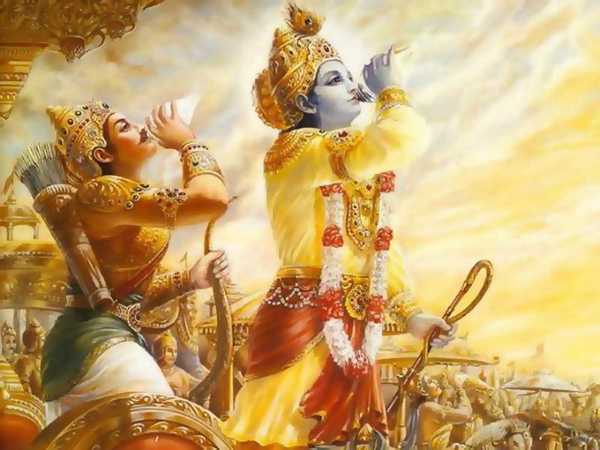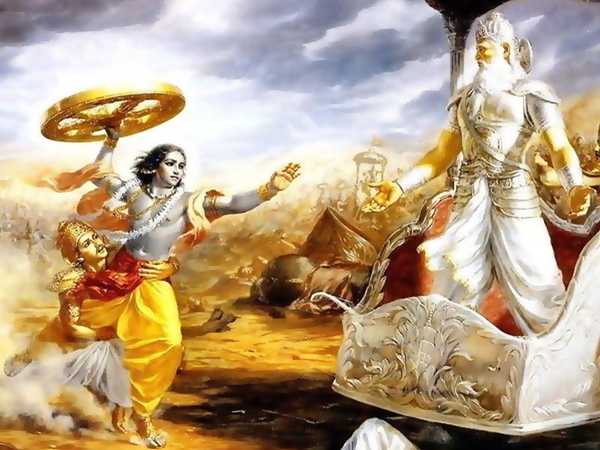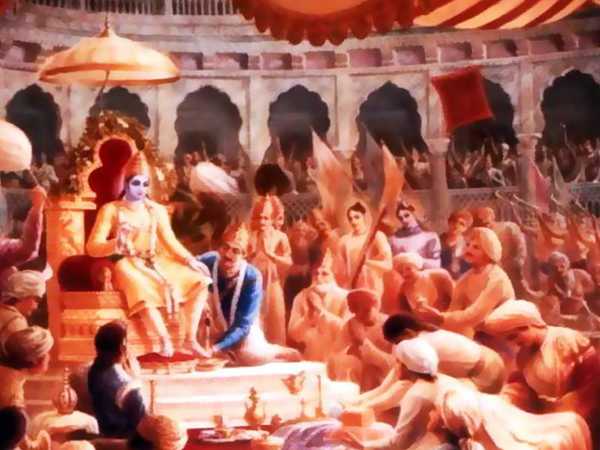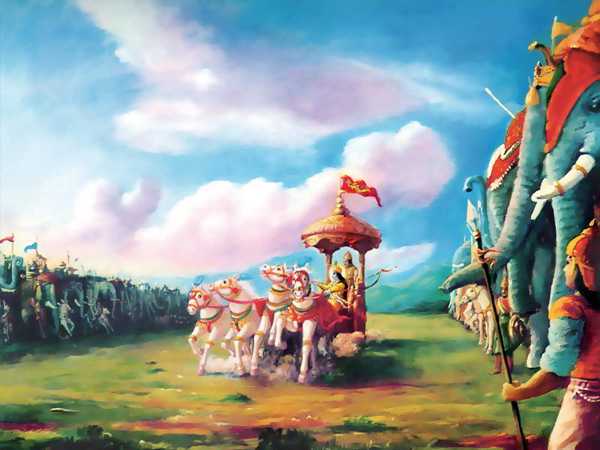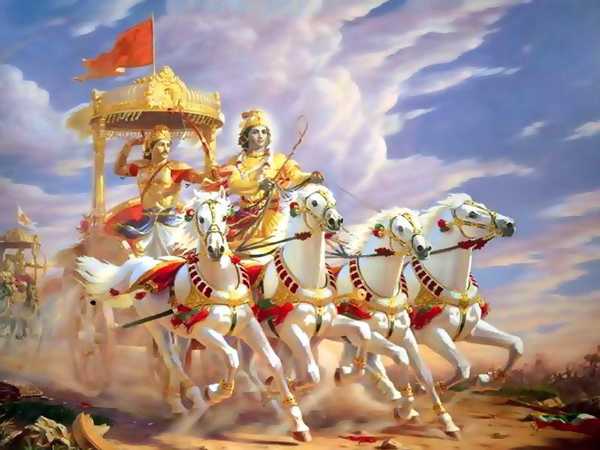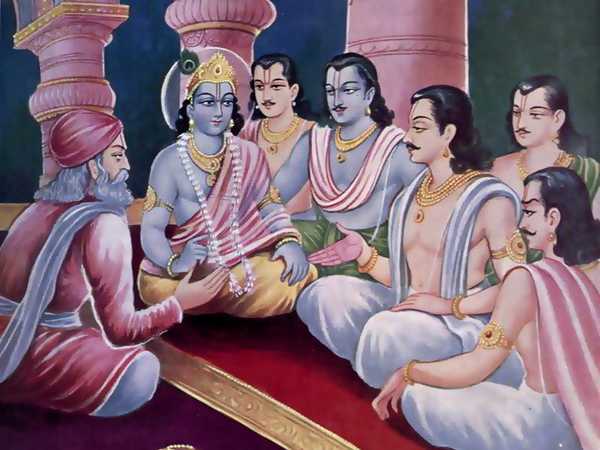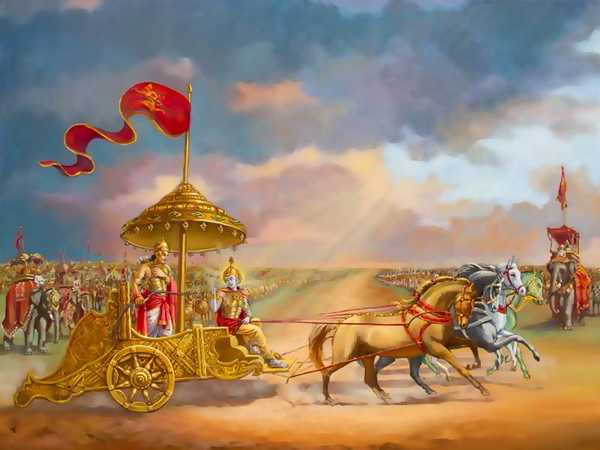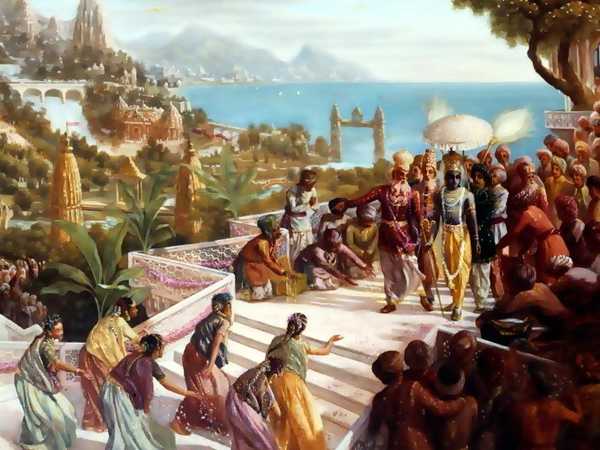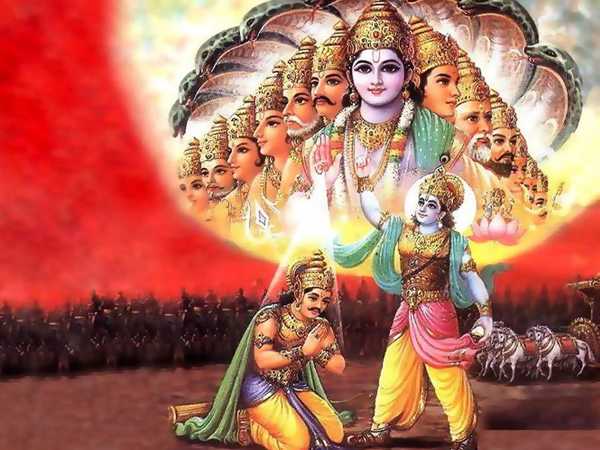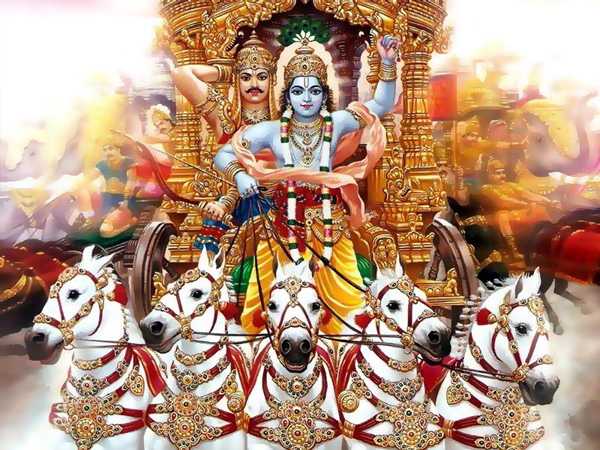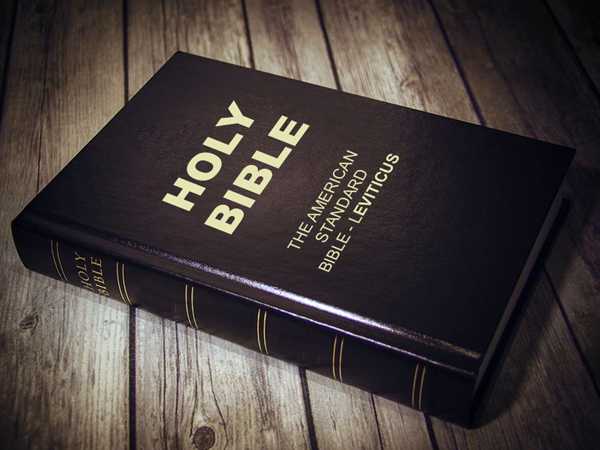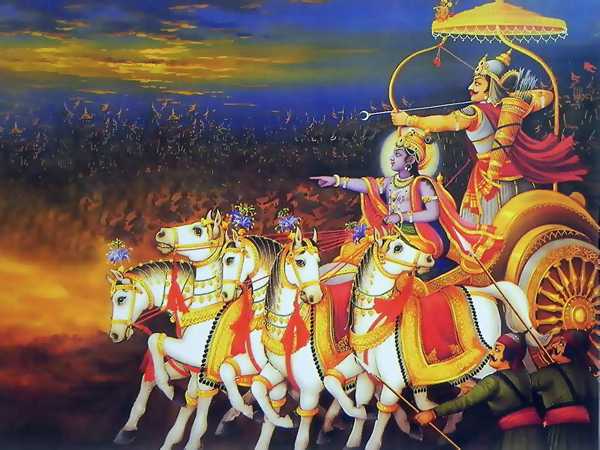Chapter 211
“Bhishma said, ‘All immobile and mobile beings, distributed into fourclasses, have been said to be of unmanifest birth and unmanifest death.
Chapter 211
Markandeya continued, “O Bharata, the fowler having expounded theseabstruse points, the Brahmana with great attention again enquired of himabout these subtle topics.
Chapter 211
“Vaisampayana said, ‘Hearing these words of Yudhishthira, Narada replied,’O son of Pritha, listen with thy brothers to me as I recite this oldstory, O Yudhishthira, exactly as everything happened. In olden days, amighty Daitya named Nikumbha, endued with great energy and strength wasborn in the race of the great Asura, Hiranyakasipu.
Chapter 212
“Bhishma said, ‘Persons engaged in the practice of acts regard thepractice of acts highly. Similarly, those that are devoted to Knowledgedo not regard anything other than Knowledge.
Chapter 212
“The Brahmana enquired, ‘How is it that fire (vital force) in combinationwith the earthly element (matter), becomes the corporeal tenement (ofliving creatures), and how doth the vital air (the breath of life)according to
Chapter 212
‘Narada continued, ‘As soon as those festivities came to an end, thebrothers Sunda and Upasunda, desirous of the Sovereignty of the threeworlds, took counsel and commanded their forces to be arranged.
Chapter 213
“Bhishma said, ‘From the attribute of Passion arises delusion or loss ofjudgment. From the attribute of Darkness, O bull of Bharata’s race, arisewrath and cupidity and fear and pride.
Chapter 213
“Markandeya said, ‘When, O Yudhishthira, all this mystery of salvationwas explained to that Brahmana, he was highly pleased and he saidaddressing the fowler,
Chapter 213
“Narada continued, ‘Then the celestial Rishis, the Siddhas, and thehigh-souled Rishis possessing the attributes of tranquillity andself-restraint, beholding that act of universal slaughter, were afflictedwith great grief.
Chapter 214
“Bhishma said, ‘I shall now tell thee what the means are (for conqueringthe senses) as seen with the eye of the scriptures. A person, O king,will attain to the highest end by the help of such knowledge and byframing his conduct accordingly. Amongst all living creatures man is saidto be the foremost.
Chapter 214
“Markandeya continued, ‘The virtuous fowler, having introduced his (both)parents to that Brahmana as his highest gurus, again spoke to him asfollows, ‘Mark thou the power of this virtue of mine, by which my innerspiritual vision is extended.
Chapter 214
“Narada continued, ‘Meanwhile the Asura brothers having subjugated theearth were without a rival. The fatigue of exertion gone, they, havingbrought the three worlds under equal sway, regarded themselves as personsthat had nothing more to do.
Chapter 215
“Bhishma said, ‘Living creatures, by being attached to objects of thesenses which are always fraught with evil, become helpless.
Chapter 215
“The fowler continued, ‘Thus cursed by that rishi, I sought to propitiatehim with these words: ‘Pardon me, O muni, I have done this wicked deedunwittingly.
Chapter 215
“Vaisampayana said, ‘The Pandavas, having established such a rule,continued to reside there. By the prowess of their arms they brought manykings under their sway. And Krishna became obedient unto all the fivesons of Pritha, those lions among men, of immeasurable energy.
Chapter 216
Vaisampayana continued, “The virtuous king Yudhishthira, having listenedto this excellent religious discourse, again addressed himself to therishi Markandeya saying,
Chapter 216
“Vaisampayana said, ‘When that spreader of the renown of Kuru’s race, thestrong-armed Arjuna, set out (for the forest), Brahmanas conversant withthe Vedas walked behind that illustrious hero to a certain distance.
Chapter 216
“Bhishma said, ‘The yogin who wishes to always practise sinlessBrahmacharya and who is impressed with the faults attaching to dreamsshould, with his whole heart, seek to abandon sleep.
Chapter 217
Markandeya continued, ‘O ornament of Kuru’s race, he (Angiras) who wasthe third son of Brahma had a wife of the name of Subha. Do thou hear ofthe children he had by her.
Chapter 217
“Vaisampayana said, ‘Then the son of the wielder of the thunderboltnarrated everything unto those Brahmanas (residing with him there), setout for the breast of Himavat. Arriving at the spot called Agastyavata,he next went to Vasishtha’s peak.
Chapter 217
“Bhishma said, ‘He cannot be said to know Brahma who does not know thefour topics (viz., dreams, dreamless slumber, Brahma as indicated byattributes, and
Chapter 218
“Markandeya continued, ‘Vrishaspati had a wife (called Tara) belonging tothe lunar world. By her, he had six sons partaking of the energy of fire,and one daughter.
Chapter 218
“Vaisampayana said, ‘Then that bull of Bharata’s race went to the sacredwaters on the banks of the southern ocean, all adorned with the asceticsresiding there. And there lay scattered five such regions where alsodwelt many ascetics.
Chapter 218
“Yudhishthira said, ‘By following what conduct, O thou that artconversant with all courses of conduct, did Janaka, the ruler of Mithilaversed in the religion of Emancipation, succeed in attaining toEmancipation, after casting off all worldly enjoyments?’
Chapter 219
“Markandeya continued, ‘He (Uktha) performed a severe penance lasting formany years, with the view of having a pious son equal unto Brahma inreputation.
Chapter 219
“Vaisampayana said, ‘Varga continued, ‘We were then, O foremost one ofBharata’s race, deeply distressed at this curse. We sought to propitiatethat Brahmana of ascetic wealth that departed not from his vow.
Chapter 219
“Bhishma said, ‘Janadeva of the race of Janaka, thus instructed by thegreat Rishi Panchasikha, once more asked him about the topic of existenceor nonexistence after death.’
Chapter 22
“Yudhishthira said, ‘Whom do the eternal Brahmanas strictly observingreligious rites call a proper object of gifts? Is a Brahmana that bearsthe symbols of the order of life he follows to be regarded as such or onewho does not bear such indications is to be so regarded?'[202]
Chapter 22
“Vaisampayana said, ‘Those foremost of men, the heroic Pandavas,–thosedelighters of their mother–became exceedingly afflicted with grief.
Chapter 22
“Dhritarashtra said, ‘They say, O Sanjaya, that the Pandavas have arrivedat Upaplavya. Go thou and enquire after them.
Chapter 22
Sanjaya said,–“Then, O bull of Bharata’s race, king Yudhishthira,disposing his own troops in counter array against the divisions ofBhishma, urged them on, saying
Chapter 22
Chapter 22
1 And the children of Israel journeyed, and encamped in the plains of Moab beyond the Jordan at Jericho.
Chapter 22
“Sanjaya said, ‘Many elephant-warriors riding on their beasts, urged bythy son, proceeded against Dhrishtadyumna, filled with rage and desirousof compassing his destruction.
Chapter 22
1 If a man shall steal an ox, or a sheep, and kill it, or sell it; he shall pay five oxen for an ox, and four sheep for a sheep.
Chapter 22
“Bhima said, ‘I will, O timid one, do even as thou sayest. I willpresently slay Kichaka with all his friends.
Chapter 22
“Sauti said, ‘The Nagas after consultation arrived at the conclusion thatthey should do their mother’s bidding, for if she failed in obtaining herdesire she might withdraw her affection and burn them all. If, on theother hand, she were graciously inclined, she might free them from hercurse. They said, ‘We will certainly render the horse’s tail black.’ Andit is said that they then went and became hairs in the horse’s tail.
Chapter 22
1 And it came to pass after these things, that God did prove Abraham, and said unto him, Abraham. And he said, Here am I.
Chapter 22
“Vasudeva continued, ‘Then O thou foremost of the Bharata race, taking upmy beautiful bow, I began to cut off with my arrows the heads of theenemies of the celestials, from off that car of costly metals!
Chapter 22
Vaisampayana said, “After this, Arjuna once more addressed his eldestbrother of unfading glory, viz., king Yudhishthira of cheerless heart,and said these words:
Chapter 22
“Gandhari said, Slain by Bhimasena, behold, the lord of Avanti liesthere! Vultures and jackals and crows are feeding upon that hero!
Chapter 22
“The Brahmana said, ‘In this connection is cited the ancient story, Oblessed one, of what the institution is of the seven sacrificing priests.
Chapter 22
“Dhritarashtra said, ‘When the Pandavas were broken by Bharadwaja’s sonin hat dreadful battle, and the Panchalas also, was there anybody thatapproached Drona for battle?
Chapter 22
1 Thou shalt not see thy brother’s ox or his sheep go astray, and hide thyself from them: thou shalt surely bring them again unto thy brother.
Chapter 22
1 And Jehovah spake unto Moses, saying,
Chapter 22
“Sanjaya said, ‘That foremost of car-warriors, O monarch, thy son, ridingon his car and filled with the courage of despair, looked resplendent inthat battle like Rudra himself of great valour.
Chapter 220
“Markandeya continued, ‘The fire called Bharata was bound by severe rulesof asceticism. Pushtimati is another name of his fire; for when he issatisfied he vouchsafes pushti (development) to all creatures, and forthis reason he is called Bharata (or the Cherisher).
Chapter 220
“Vaisampayana said, ‘Then Arjuna of immeasurable prowess saw, one afteranother, all the sacred waters and other holy places that were on theshores of the western ocean. Vibhatsu reached the sacred spot calledPrabhasa.
Chapter 220
“Yudhishthira said, ‘By doing what does one acquire happiness, and whatis that by doing which one meets with woe? What also is that, O Bharata,by doing which one becomes freed from fear and sojourns here crowned withsuccess (in respect of the objects of life)?’
Chapter 221
Markandeya continued, “Mudita, the favourite wife of the fire Swaha, usedto live in water. And Swaha who was the regent of the earth and sky begetin that wife of his a highly sacred fire called Advanta.
Chapter 221
“Vaisampayana said, ‘O best of monarchs, within a few days after this,there commenced on the Raivataka mountain, a grand festival of theVrishnis and the Andhakas. At the mountain-festival of the Bhojas, theVrishnis and the Andhakas, the heroes of those tribes began to give awaymuch wealth unto Brahmanas by thousands.
Chapter 221
“Yudhishthira said, ‘The three regenerate classes, who are given tosacrifices and other rites, sometimes eat the remnants, consisting ofmeat and wine, of sacrifices in honour of the deities, from motives ofobtaining children and heaven. What, O grandsire, is the character ofthis act?’
Chapter 222
“Markandeya continued, ‘O sinless scion of Kuru’s race, I have describedto thee the various branches of the race of Agni. Listen now to the storyof the birth of the intelligent Kartikeya.
Chapter 222
“Vaisampayana said, ‘Then Dhananjaya, informed of the assent ofYudhishthira, and ascertaining, O Janamejaya, that the maiden had gone tothe Raivataka hill, obtained the assent of Vasudeva also, after havingsettled in consultation with him all that required to be done.
Chapter 222
“Yudhishthira said, ‘In this world, O Bharata, acts good and bad attachthemselves to man for the purpose of producing fruits for enjoyment orendurance. Is man, however, to be regarded as their doer or is he not tobe regarded so? Doubt fills my mind with respect to this question. Idesire to hear this in detail from thee, O grandsire!’
Chapter 223
“The lady replied, ‘I am a daughter of Prajapati (the lord of allcreatures, Brahma) and my name is Devasena. My sister Daityasena has erethis been ravished by Kesin.
Chapter 223
“Vaisampayana said, ‘When the heroes of the Vrishni race began to speakrepeatedly in this strain, Vasudeva uttered these words pregnant withdeep import and consistent with true morality. Gudakesa (the conqueror ofsleep or he of the curly hair), by what he hath done, hath not insultedour family.
Chapter 223
“Yudhishthira said, ‘Tell me, O grandsire, by adopting what sort ofintelligence may a monarch, who has been divested of prosperity andcrushed by Time’s heavy bludgeon, still live on this earth.’
Chapter 224
“Markandeya continued, ‘O lord of men, the beautiful Siva endowed withgreat virtues and an unspotted character was the wife of Angiras (one ofthe seven Rishis).
Chapter 224
“Vaisampayana said, ‘The Pandavas, after they had taken up their abode atIndraprastha at the command of Dhritarashtra and Bhishma began to bringother kings under their sway. All the subjects (of the kingdom) livedmost happily depending upon Yudhishthira the just, like a soul livinghappily depending upon a body blest with auspicious marks and piousdeeds.
Chapter 224
“Bhishma said, ‘Once more, laughing at Vali who was sighing like a snake,Sakra addressed him for saying something more pointed than what had saidbefore.[837]
Chapter 225
“Markandeya continued, ‘When that powerful, high-souled, and mighty beingwas born, various kinds of fearful phenomena occurred. And the nature ofmales and females, of heat and cold, and of such other pairs ofcontraries, was reversed.
Chapter 225
“Bhishma said, ‘After this, he of hundred sacrifices beheld the goddessof Prosperity, in her own embodied form that blazed splendour, issue outof the form of the high-souled Vali. The illustrious chastiser of Paka,beholding the goddess blazing with radiance, addressed Vali in thesewords, with eyes expanded in wonder.’
Chapter 226
“Markandeya continued, The planets with their satellites, the Rishis andthe Mothers, Agni and numerous other blazing courtiers and many otherdwellers of heaven of terrible mien, waited on Mahasena along with theMothers.
Chapter 226
“Vaisampayana said, ‘Then Havyavahana (Agni) in anger and disappointment,with his ailment uncured, went back to the Grandsire.
Chapter 226
“Bhishma said, ‘In this connection is also cited the old narrative of thediscourse between him of a hundred sacrifices and the Asura Namuchi, OYudhishthira.
Chapter 227
“Markandeya continued, ‘Now hear of those terrible and curious-lookingfollowers of Skanda. A number of male children came into being whenSkanda was struck with the thunder-bolt,–those terrific creatures
Chapter 227
“Vaisampayana, said, ‘Thus addressed by Arjuna, the smoke-banneredHutasana, desirous of an interview with Varuna, recollected that son ofAditi,–that deity protecting one of the points of the heavens and havinghis home in the water and ruling that element.
Chapter 227
“Yudhishthira said, ‘What, indeed, is good for a man that is sunk in diredistress, when loss of friends or loss of kingdom, O monarch hasoccurred? In this world, O bull of Bharata’s race, thou art the foremostof our instructors. I ask thee this. It behoveth thee to tell me what Iask.’
Chapter 228
“Markandeya continued, ‘Skanda was adorned with a golden amulet andwreath, and wore a crest and a crown of gold; his eyes weregolden-coloured, and he had a set of sharp teeth; he was dressed in a redgarment and looked very handsome;
Chapter 228
“Vaisampayana said, ‘Then those foremost of car-warriors (Krishna andArjuna), riding in their cars and placing themselves on opposite sides ofthat forest, began a great slaughter, on all sides, of the creaturesdwelling in Khandava.
Chapter 228
“Yudhishthira said, ‘Tell me, O grandsire, the indications of futuregreatness and future fall in respect of a person.’
Chapter 229
“Markandeya continued, ‘Those six ladies, the wives of the seven Rishiswhen they learned that good fortune had smiled on Mahasena and that hehad been made leader of the celestial forces,[79] repaired to his camp.
Chapter 229
“Vaisampayana said, ‘Then Vibhatsu, the son of Pandu, invoking hisexcellent weapons, prevented that shower of rain by Indra, by means of ashower of his own weapons. And Arjuna of immeasurable soul soon coveredthe forest of Khandava with innumerable arrows like the moon covering theatmosphere with a thick fog.
Chapter 229
“Yudhishthira said, ‘By what disposition, what course of duties, whatknowledge, and what energy, does one succeed in attaining to Brahma whichis immutable and which is beyond the reach of primordial nature.'[866]
Chapter 23
1 And Jehovah spake unto Moses, saying,
Chapter 23
“Sanjaya said, ‘During the progress of that terrible and awful battle,the army of thy son was broken by the Pandavas. Rallying their greatcar-warriors, however, with vigorous efforts, thy sons continued to fightwith the Pandava army.
Chapter 23
“Yudhishthira said, ‘I desire thee, O grandsire, to tell me what theordinances are that have been laid down by the acts touching the deitiesand the (deceased) ancestors on occasions of Sraddhas.’
Chapter 23
“Vaisampayana said. ‘That foremost one of Bharata’s race, then orderedhis troops, which were protected by heroes that were headed by Arjuna andthat resembled the very guardians of the universe, to march out.Instantly, a loud clamour arose consisting of the words–Equip,Equip!
Chapter 23
“Vaisampayana said, ‘Having beard these words of king DhritarashtraSanjaya went to Upaplavya to see the Pandavas of immeasurable strength.
Chapter 23
Sanjaya said,–“Beholding the Dhartarashtra army approach for fight,Krishna said these words for Arjuna’s benefit.”
Chapter 23
Vaisampayana said,–‘then that foremost of all speakers, Krishna of theYadava race, addressing king Jarasandha who was resolved upon fighting,said,–‘O king, with whom amongst us three dost thou desire to fight? Whoamongst us shall prepare himself for battle (with thee)?’
Chapter 23
1 And Balaam said unto Balak, Build me here seven altars, and prepare me here seven bullocks and seven rams.
Chapter 23
“Sanjaya said, ‘While Sahadeva, filled with rage, was thus blasting thyhost, Duhshasana, O great king, proceeded against him, the brotheragainst the brother.
Chapter 23
1 Thou shalt not take up a false report: put not thy hand with the wicked to be an unrighteous witness.
Chapter 23
“Vaisampayana said, ‘Then all the relatives of Kichaka, arriving at thatplace, beheld him there and began to wail aloud, surrounding him on allsides.
Chapter 23
“Sauti said, ‘Having crossed the Ocean, Kadru of swift speed, accompaniedby Vinata, soon alighted near the horse. They then both beheld thatforemost of steeds of great speed, with body white as the rays of themoon but having black hairs (in the tail). And observing many black hairsin the tail, Kadru put Vinata, who was deeply dejected, into slavery. Andthus Vinata having lost the wager, entered into a state of slavery andbecame exceedingly sorry.
Chapter 23
1 And the life of Sarah was a hundred and seven and twenty years. These were the years of the life of Sarah.
Chapter 23
Vaisampayana continued, “After the chief of the Dasharhas had departed,the heroic Yudhishthira, and Bhima, and Arjuna, and the twins, eachlooking like unto Shiva, and Krishna, and their priest, ascending costlycars unto which were yoked excellent steeds, together went into theforest.
Chapter 23
Vaisampayana said, “Thus addressed by Arjuna of curly hair, the Kuru kingborn of Kunti remained speechless. Then the island-born (Vyasa) saidthese words.
Chapter 23
“Gandhari said, There lies Shalya, the maternal uncle himself of Nakula,slain in battle, O sire, by the pious and virtuous Yudhishthira!
Chapter 23
“The Brahmana said, ‘In this connection, O blessed lady, is cited theancient story of what kind the institution is of the five sacrificingpriests. The learned know this to be a great principle that Prana andApana and Udana and Samana and Vyana are the five sacrificing priests.'”
Chapter 23
“Dhritarashtra said, ‘Tell me, O Sanjaya, the distinctive indications ofthe cars of all those who, excited with wrath and headed by Bhimasena,had proceeded against Drona.’
Chapter 23
1 He that is wounded in the stones, or hath his privy member cut off, shall not enter into the assembly of Jehovah.
Chapter 230
Markandeya continued, “When Skanda had bestowed these powers, Swahaappeared to him and said, ‘Thou art my natural son,–I desire that thoushalt grant exquisite happiness to me.”
Chapter 230
Vaisampayana said, ‘Then the inhabitants of the forest of Khandava, theDanavas and Rakshasas and Nagas and wolves and bears and other wildanimals, and elephants with rent temples, and tigers, and lions withmanes and deer and buffaloes by hundreds, and birds, and various othercreatures, frightened at the falling stones and extremely anxious, beganto fly in all directions.
Chapter 230
“Yudhishthira said, ‘What man is there who is dear to all, who gladdensall persons, and who is endued with every merit and every accomplishment?’
Chapter 231
Vaisampayana said, “After those Brahmanas and the illustrious sons ofPandu had taken their seats, Draupadi and Satyabhama entered thehermitage. And with hearts full of joy the two ladies laughed merrily andseated themselves at their ease.
Chapter 231
“Janamejaya said, ‘O Brahmana, tell me why and when that forest burnt inthat way, Agni consumed not the birds called Sarngakas?
Chapter 231
“Yudhishthira said, ‘I desire, O thou of Kuru’s race, to know what theorigin and what the end is of all creatures; what is the nature of theirmeditation and what are their acts; what are the divisions of time, andwhat the allotted periods of life in the respective epochs.



